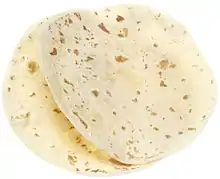 Flour tortilla | |
| Type | Flatbread |
|---|---|
| Place of origin | Spain |
| Main ingredients | Wheat flour |
A flour tortilla (/tɔːrˈtiːə/, /-jə/) or wheat tortilla is a type of soft, thin flatbread made from finely ground wheat flour. Made with flour- and water-based dough, it is pressed and cooked, similar to corn tortillas.[1] The simplest recipes use only flour, water, fat, and salt, but commercially-made flour tortillas generally contain chemical leavening agents such as baking powder, and other ingredients.[2]
History
Flour tortillas originated in Spain during the Muslim conquest of Spain which lasted for eight centuries and left a mark in the culture, language, and cuisine of the Iberian Peninsula.[3] There are several accounts of flatbread that became popular in Iberia during that period, especially rghaif which were called tortillas in the Spanish language of the period.[3] Several recipes of flatbreads can be found in the 13th Century Anonymous Andalusian Cookbook and others. The recipe is the same as modern-day tortillas.[4] When Spaniards arrived in the Americas they simply brought the recipe with them, this is also the reason the most widespread term for corn tortillas comes from Spanish and not from indigenous languages.
The name itself comes from Latin. Tortilla is the diminutive of torta, a shortened form of torta panis (twisted bread), which has cognates in different romance languages such as tourte in French or torta in Italian. These words have different meanings but all of them refer to a cake-shaped bread or preparation.[3]
Some people consider flour tortillas to be an adaptation of corn tortillas due to the lack of corn availability in Northern Mexico, however, this doesn't explain the fact that they're also consumed in El Salvador and that the preparation involves a completely different technique which was already widespread among Spaniards at the time of the Conquest.
It is said by some that flour tortillas originated in the northern Mexican states of Chihuahua, Durango, Sonora and Sinaloa, where the territory is more suited to growing wheat than corn. In recent times, they have become integral to Mexican American (most notably in the form of a burrito), Mexican—and Tex-Mex—cuisine. Mexican Americans talk about the flour tortilla having come from the wheat-filled plenty of the United States. Most often it is attributed to Alta California when California was still part of the Mexican Republic. Most specifically, it is credited to regions of Northern & Central California with the first mass-produced flour tortillas having come from flour tortilla factories in metropolitan Los Angeles. Some have even attributed the origin of flour tortillas to Jewish immigrants of the United States.[5]
Etymology
Tortilla, from Spanish torta, cake, plus the diminutive -illa, literally means "little cake".
Tortilla in Iberian Spanish also means omelette.[6][7] As such, this wheat flour flatbread tortilla is not to be confused with the Spanish omelette or any other egg based one.
Production
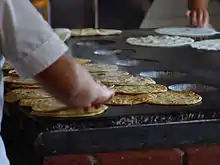

Wheat tortillas are a staple of the northern Mexican states[8] (such as Sonora, Sinaloa and Chihuahua) and throughout the Southwestern United States.
Tortillas vary in size from about 6 to over 30 cm (2.4 to over 12 in), depending on the region of the country and the dish for which it is intended.
Industrially-produced tortillas typically contain numerous chemicals in order to ease the production process, control texture and flavor, and to extend shelf life. Work has been done at Washington State University to develop methods for producing tortillas on a mass scale while still using only whole-wheat flour, water, oil, and salt, with a fermented flour-and-water sourdough starter replacing chemical leaveners.[9]
Tortillas today
.JPG.webp)
Today, personal and industrial (Mexican-style) tortilla-making equipment has facilitated and expedited tortilla making. Manually operated wooden tortilla presses of the past led to today's industrial tortilla machinery, which can produce up to 60,000 tortillas per hour. Tortillas are now not only made from maize meal, but also from wheat flour; home-made and store-bought tortillas are made in many flavors and varieties.
Tortillas remain a staple food in Mexico and Central America, and have gained popularity and market share elsewhere. In the U.S., tortillas have grown from an "ethnic" to a mainstream food. They have surpassed bagels and muffins, and have now become the number two packaged bread product sold in the U.S (behind sliced bread). The Tortilla Industry Association (TIA) estimates that in the U.S. alone, the tortilla industry (tortillas and their products – tortilla chips, tostada shells and taco shells) has become a US$6 billion a year industry.[10]
Nutritional information
Soft wheat tortillas use wheat instead of masa as the primary ingredient. The Mission Foods brand lists the following ingredients: enriched bleached wheat flour (wheat flour, niacin, reduced iron, thiamine mononitrate, riboflavin, folic acid), water, vegetable shortening (interesterified soybean oil, hydrogenated soybean oil and/or palm oil), contains 2% or less of: salt, sugar, leavening (sodium bicarbonate, sodium aluminum sulfate, corn starch, monocalcium phosphate and/or sodium acid pyrophosphate, calcium sulfate), distilled monoglycerides, enzymes, wheat starch, calcium carbonate, antioxidants (tocopherols, ascorbic acid, citric acid), cellulose gum, guar gum, dough conditioner (fumaric acid, sodium metabisulfite and/or mono- and diglycerides), calcium propionate and sorbic acid (to preserve freshness).[11]
The recipe recommended by American chef and restaurateur Rick Bayless who specializes in traditional Mexican cuisine uses just four ingredients: flour, lard, salt, and water.[12]
The nutritional info for the Mission brand 49 g wheat tortilla is:[13]
- total fat: 3.5 g (saturated 3.5 g, monounsaturated 1 g) - 5% daily allowance
- sodium: 420 mg - 18% daily allowance
- total carbohydrate: 24 g - 8% daily allowance
- dietary fiber: 1 g - 4% daily allowance
- protein: 4 g
- calcium: 8% daily allowance
- iron: 8% daily allowance
Consumption
Wheat flour tortillas have been used on many American spaceflights since 1985 as an easy solution to the problems of handling food in microgravity and preventing bread crumbs from escaping into delicate instruments.[14]
Mexico
The word "tortilla" in these countries is used to refer to the ubiquitous corn tortilla, made of maize. In Mexico burritos are made with wheat tortillas. Flour tortillas are also very popular in Tex-Mex food and plates like fajitas. Flour tortilla with beans and eggs was very popular in northern Mexico and in the Southwest. The origin of the flour tortilla was northern Mexico and this is why so many plates are made with it like quesadillas as well as burritos, chimichangas and fajitas served with flour tortilla and bean taco or chorizo taco. The flour tortilla is the sister to the corn tortilla which was created first. From Mexico City southward the corn tortilla is more popular but in northern Mexico, where it originated, the flour tortilla may be as popular, if not more popular, than the corn tortilla.
Flour tortillas are commonly filled with meat, chopped potatoes, refried beans, cheese, hot sauce and other ingredients to make dishes such as tacos, quesadillas and burritos (a dish originating in the Ciudad Juarez, Chihuahua, Mexico/El Paso, Texas area).
United States, U.S. territories and Northern Mexico
In Northern Mexico and much of the United States, "tortillas" mean wheat-flour tortillas. They are the foundation of Mexican border cooking. Their popularity was driven by the low cost of inferior grades of wheat flour provided to border markets and by their ability to keep and ship well.[15]
In Guam, it is called titiyas and it is paired with kelaguen mannok.
Tortilla art is the use of tortillas as a substrate for painting. Tortillas are baked and then covered in acrylic before they are painted.[16]
Central America
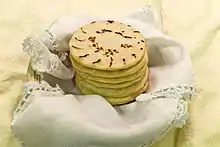
Tortillas in Central America sometimes differ somewhat from their Mexican counterparts, although are made similarly. In Guatemala and El Salvador, the tortillas are about 5 millimeters thick and about 10 centimeters in diameter, thicker than Mexican tortillas, but similar in size to Mexican gorditas. Like the Mexican tortillas, the maize is soaked in a mixture of water and lime (or lye), then rinsed and ground. In El Salvador, they sometimes use sorghum (called maicillo there) to make tortillas when there is not enough maize.[17] Also in El Salvador, there is a particularly large and thick tortilla called a "chenga"[18] on top of which food is placed, like an edible plate, to serve food to the labourers in coffee plantations and farms.
Honduras is well known for using wheat flour tortillas to make baleadas, which consist of a wheat flour tortilla, folded in half, with various items (beans, cream, scrambled eggs) put inside.
Maize and wheat tortillas can often be found in supermarkets in El Salvador and Costa Rica produced by Mexican companies.
Stuffed tortillas known as pupusas are also a famous dish of traditional Salvadoran cuisine.
United States
Tortillas are widely used in the United States, in recipes of Mexican origin and many others. As a testament to their popularity, the Tortilla Industry Association (TIA) estimated Americans consumed approximately 85 billion tortillas in 2000 (not including tortilla chips). They are more popular than all other ethnic breads such as English muffins, pita bread, and bagels.[19]
Tortilla chips –made from maize tortillas cut into wedges, then fried – first gained popularity in the 1940s in Los Angeles, California, and were mass-produced there. The ingredients in maize tortillas are maize, lime, and water. Fried chips add salt and vegetable oil.
Flour tortillas are commonly used in burritos. They are also used to make fajitas,[20] wraps, sandwiches, quesadillas, casseroles and stews, and there are numerous other uses.
Many people from both Northern Mexico and throughout the Southwestern United States eat tortillas as a staple food. Many restaurants use wheat flour tortillas in a variety of non-Mexican and Mexican recipes. Many grocery stores sell ready-made tortillas.[21]
See also
- Arepa, a ground maize dough from Colombia and Venezuela
- Focaccia, a flat oven-baked bread from Italy
- Chapati, an unleavened flatbread from the Indian subcontinent
- Injera, a sourdough-risen flatbread from East Africa
- Khachapuri, a breaded cheese dish from Georgia
- Khubz, a round bread from the Middle East
- Matnakash, a leavened bread from Armenia
- Piadina, a thin, flatbread from Northern Italy
- Pită de Pecica, a round bread from Romania
- Rghaif, a pancake-like bread from Northwest Africa
References
- ↑ Dishes from the Wild Horse Desert: Norteo Cooking of South Texas, by Melissa Guerra,1 edition 2006, Wiley;ISBN 978-0764558924
- ↑ Rooney, L. W.; Serna-Saldivar, Sergio O. (1 January 2015). Tortillas: Wheat Flour and Corn Products. Elsevier. ISBN 9780128123683 – via Google Books.
- 1 2 3 Bowels, David. "Mexican X-plainer: Al-Andalus & the Flour Tortilla". Medium.
- ↑ Anonymous. "13th Century Al-Ándalus Cookbook" (PDF).
- ↑ Laperruque, Emma (3 March 2018). "The Tricky, Twisty History of Flour Tortillas". food 52. Retrieved 2021-05-27 – via food52.com.
- ↑ ASALE, RAE-. "tortilla". «Diccionario de la lengua española» - Edición del Tricentenario (in Spanish). Retrieved 2019-11-02.
- ↑ "Tortilla | Definition of Tortilla by Lexico". Lexico Dictionaries | English. Archived from the original on November 2, 2019. Retrieved 2019-11-02.
- ↑ "Explorando México - la Tortilla, Elemento Esencial de la GastronomÃa Mexicana".
- ↑ Strom, Stephanie (15 June 2015). "Chipotle's Quest to Develop a Better Tortilla". The New York Times. ISSN 0362-4331. Retrieved 2019-11-19 – via NYTimes.com.
- ↑ "Tortilla Statistics and Trends". Aibonline.org. Retrieved 2012-08-06.
- ↑ "Mission Flour Soft Taco 10ct | Mission Foods". www.missionmenus.com. Retrieved 2018-04-22.
- ↑ Flour tortillas. "Recipe from "Authentic Mexican"". Frontera. Retrieved November 19, 2019.
- ↑ "Mission Flour Soft Taco 10ct | Mission Foods". www.missionmenus.com. Retrieved 2018-04-22.
- ↑ Food For Space Flight NASA. Retrieved: 2012-09-08.
- ↑ California Mexican-Spanish Cook Book; Selected Mexican and Spanish Recipes, by Bertha Haffner-Ginger, Citizen Print Shop, Los Angeles, 1914.
- ↑ Tackling the taco: A guide to the art of taco eating, by Sophie Avernin, Vuelo Mexicana.
- ↑ "Cultivarán el maicillo para producir miel: 8 de Agosto 2005 .::. El Diario de Hoy". Elsalvador.com. Retrieved 2012-08-06.
- ↑ Meza, Joaquín, Real Diccionario de la Vulgar Lengua Guanaca, ISBN 978-99923-70-60-5, p 178
- ↑ TIA news first quarter 2001
- ↑ "Ortega Flour Tortillas". Ortega.
- ↑ Ramona's Spanish-Mexican Cookery; The First Complete and Authentic Spanish-Mexican Cook Book in English, by Pauline Wiley-Kleemann, Editor, West Coast Publishing Co., Los Angeles, 1929.
External links
 Media related to Flour tortillas at Wikimedia Commons
Media related to Flour tortillas at Wikimedia Commons Media related to Flour tortilla at Wikimedia Commons
Media related to Flour tortilla at Wikimedia Commons Flour Tortilla at the Wikibooks Cookbook subproject
Flour Tortilla at the Wikibooks Cookbook subproject Tortilla at the Wikibooks Cookbook subproject
Tortilla at the Wikibooks Cookbook subproject The dictionary definition of flour tortilla at Wiktionary
The dictionary definition of flour tortilla at Wiktionary
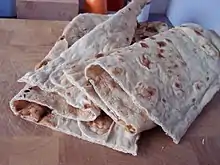

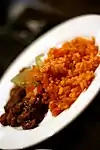

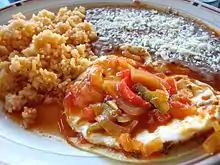
.jpg.webp)
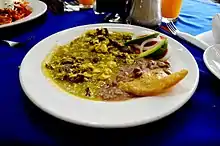

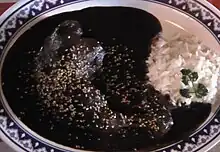
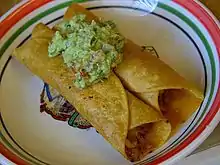
_01.JPG.webp)